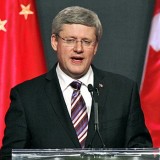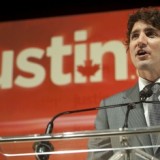It’s October – Breast Cancer Awareness Month – which means, the fundraising drive for the annual “Enbridge Ride to Conquer Cancer” is revving up.
I first raised my concerns about this event in several articles last year, questioning the ethics of the alliance between the fundraising arm of the province’s BC Cancer Agency – a.k.a. the BC Cancer Foundation – and controversial oil and gas pipeline titan Enbridge.
Reading the comments on my stories, I gained a new appreciation for how sensitive the topic of cancer philanthropy is. Critiques ranged from hypocrisy for using petrochemical products myself to the fact that Enbridge, being only a pipeline company, doesn’t actually make oil products, to the following heartfelt comment from someone identifying herself as Anne:
…till you have sat at the bedside of a loved one and seen them die you have no clue as to my heartache, and by tarnishing the Ride you are possibly prolonging finding a cure.
While I believe we need to be able to engage in a rational, principled debate about this event, I appreciate Anne’s point, to whatever degree I can, given I have not walked in her shoes. Since last year’s event I’ve had time to reflect further on the issue and even come up with some positive alternatives.
On that note, I offer to Anne and others who wish to keep raising funds for caner through a cycling event, an alternative to the Enbridge Ride. The “Ride2Survive” is described on the organization’s website as “a one-day cycling event from Kelowna to Delta BC to raise funds for cancer research through as an Independent Fundraising Event for the Canadian Cancer Society.” The organization also boasts that 100% of the funds raised from the ride go directly to cancer research, something few cancer research initiatives can claim.
Back to the “Enbridge Ride” – a two-day trek from BC to Washington State – which is ramping up toward its fifth year next summer. The event in BC is joined by similar ones in Alberta, Ontario and Quebec. Enbridge, which began as the BC event sponsor, became the national sponsor for all four events in 2010. The proceeds from the BC fundraiser go to the BC Cancer Foundation, which is the fundraising arm of the BC Cancer Agency, a department of Ministry of Health. In my first story on the subject, I pointed to the confusion caused by the event’s brand – its graphics and signage are all in the colours of the better known and highly respected Canadian Cancer Society, which has nothing to do with this event.
A commenter on my story who identified himself as Steve Merker, wrote, “As someone intimately involved in developing the Ride to Conquer Cancer concept and branding, i can assure you in no way did we ever try to confuse the public. Yellow and cycling and cancer have strong associations via Lance Armstrong / Tour de France. The blue is similar to the Princess Margaret Cancer Centre’s blue.”
If the yellow is for Lance Armstrong, they may want to change colours right about now.
In any event, I do believe it’s important for donors to be clear on where their money’s going.
The real issue here, though, is the matter of allowing Enbridge to greenwash its sullied image in the midst of a highly contentious battle over a proposed pipeline through BC, and the hypocrisy of a cancer-fighting organization taking money from a company who deals in products that cause cancer. (More on that in a moment).
The website for the ride boasts the following: “…2879 participants across British Columbia and the Pacific Northwest raised $11.1 million in the third annual Enbridge Ride to Conquer Cancer. Since its inception in 2009, the Ride has raised $27.2 million, making it the most successful cancer-related fundraising event in B.C. history.”
Yet amidst all this success, the Cancer Foundation clearly grew concerned when I started asking questions and writing critically about the event. My columns provoked significant interest and lively debate online and the first of these prompted the BC Cancer Foundation to develop an internal PR strategy to better defend the program to the press and public, largely based on my initial questions to them. The document was leaked to reporter Stephen Hui of the Georgia Straight. I detailed the key questions and canned answers in a subsequent story.
One of my biggest beefs with the ride remains the connection between cancer and petroleum products – for which Enbridge is a central conduit throughout North America.
I asked BC Cancer Foundation representative Allison Colina, “Is it hypocritical for your organization to accept sponsorship from a company who deals in a known cancer-causing product?”
Her reply: “With regards to petroleum products causing cancer, we turn to the research and clinical experts at the BC Cancer Agency to determine what are cancer-causing substances…According to the World Health Organization, there is no conclusive research at this time that indicates that petroleum products cause cancer.”
That’s gross distortion at best. According to the International Agency for Research on Cancer – the WHO subsidiary group that produces the list of known and probable human carcinogens Ms. Colina referred to – “‘Petroleum refining (workplace exposures in)’ is a probable carcinogen.” Moreover, Benzene, a byproduct of petroleum, is listed as a known carcinogen (that’s pretty conclusive to me).
I also contacted Dr. Karen Bartlett of the UBC School of Environmental Health at the time, posing to her the same question: “To what extent can petroleum products be considered carcinogenic?” Here’s what she told me by phone:
There are two major petroleum products that we know are associated with carcinogenicity. One is in the distillation process of petroleum products, which produces Benzene. Benezene is carcinogenic. The other is in the combustion of diesel. Diesel particulate is carcinogenic.
A commenter on my story, Rob Baxter, added that, according to the American Lung Association, “Air pollution contributes to … lung cancer….In 1996, transportation sources were responsible for 47% of pollutant emissions.” Also according to the same organization, “The production of particulate matter (PM) less than 10_m is associated particularly with the combustion of carbon-based and sulphur-based chemicals such as gasoline and diesel. Exposure has been linked with… serious health effects including cancer.”
Ms. Colina and her organization are misleading the public when they say, “According to the World Health Organization, there is no conclusive research at this time that indicates that petroleum products cause cancer.” All that’s left is the defense raised by some that Enbridge doesn’t make or burn the oil products, so they’re okay. I think that’s nonsensical, but I should also note that Enbridge recently bought a controlling stake in what will soon be the largest and most carbon-emitting natural gas plant in North America, the Cabin Gas Plant in northeast BC.
They also continue to wreak ecological devastation with oil spills across the continent.
The fact that Enbridge is in no way suitable to be the title sponsor of a cancer research fundraiser should be as plain as day to anyone, especially the BC Cancer Foundation.
The other big issue I have with this event is the way it enables a highly controversial company which is aggressively targeting environmental groups and First Nations as we speak for opposing their highly unpopular proposed Northern Gateway Pipeline from the Alberta Tar Sands to BC’s coast.
If the Ride in any way helps Enbridge burnish its reputation in order to advance this pipeline and oil tankers on our coast, then I have a problem with that. And make no mistake, corporate social responsibility pledges aside, no corporation, including Enbridge, spends one dollar sheerly out of goodwill. Enbridge is sponsoring this event for business reasons and none other.
Moreover, I particularly have a problem with the connection between this event and the provincial government, which is the recipient of these research funds.
It is this point which resonated for readers when I first wrote about the issue.
Noelle wrote: “I too am a cancer survivor and have participated in the ride for the last two years. I also had signed up for the 2011 ride before Enbridge came on board and was appalled when I discovered this.”
This from one Sonya McCarthy: “I have watched Enbridge’s tactics and seen the undermining of local communities the right to say “no” whith the possible environmental damage by crossing hundreds of Salmon bearing rivers and streams. Where a spill from the increase tankers could cause an ecological disaster and there is no plan to clean up the mess.”
And a David Munro had this to say: “Given that my father died of cancer, it’s natural that I would want to support an event such as this. On the other hand, his particular cancer was hairy cell leukaemia, caused by long-term exposure to petroleum products.”
The Enbridge Ride controversy falls within a larger conversation that is only just beginning, catalyzed by films like Pink Ribbons, Inc. and books like Selling Sickness by Ray Moynihan and Alan Cassels, which contend that cancer treatment has become an industry driven by drug companies, while prevention takes a back seat because it’s less profitable. They also raise questions about the bureaucratic waste of large cancer charities and more and more funds being diverted to overhead and salaries.
This conversation – also covered by Miranda Holmes in these pages recently – is long overdue, and yet, I now understand why it has been so slow and difficult to foment.
I suggest we can no longer muzzle debate about cancer research and prevention with taboos designed to protect the status quo. The discussion must certainly be imbued with compassion and sensitivity to the pain of losing a loved one to this disease. But we need to be able to ask questions about the ethics of any fundraising initiative and debate the merits of different approaches to taking on cancer. Prevention, through healthy lifestyles and the restriction of environmental toxins, must play a far more prominent role in this discussion.
Moreover, Enbridge, a company whose products cause cancer, should not be able to shroud itself in a bullet-proof PR shield by linking itself with cancer research. This is a company that does not have the support of the public or First Nations in BC and threatens to destroy the things we hold dear – our rivers, salmon, coastline, communities, cultures and ways of life. As I write this, thousands of citizens are preparing to gather in our capital in one of the largest environmental demonstrations on record, to speak out against oil on BC’s coast.
The heavy-handed tactics of Enbridge and its supporters in the Harper Government have rubbed British Columbians and First Nations the wrong way for a long time now and Enbridge should not be getting any help from cancer philanthropies to repair its image.
To those who wish to ride for cancer – and I applaud them for their heartfelt commitment and sincere efforts for a noble cause – I suggest the alternative of the Ride2Survive.
To the BC Cancer Foundation, I suggest you can do better than Enbridge.







